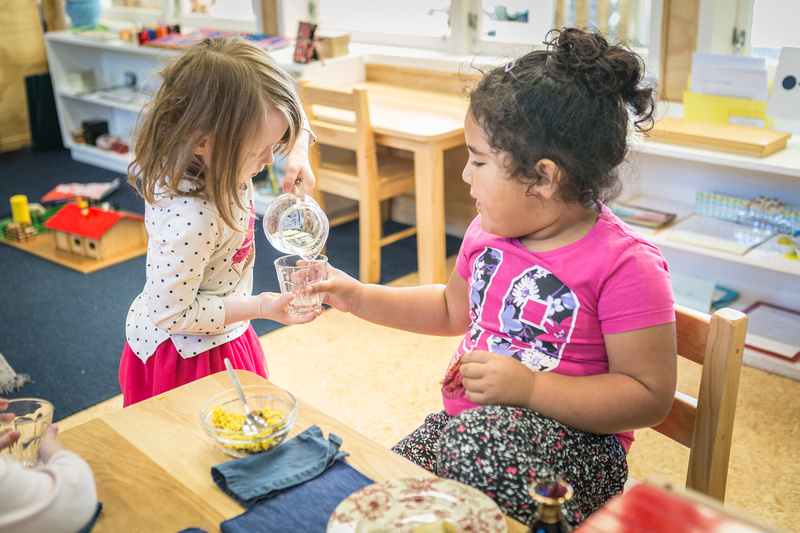 By Amy Johnson — Kōwhai Head Teacher – Preschool
By Amy Johnson — Kōwhai Head Teacher – Preschool
As the season changes and different fruit and vegetables become more available, there is a real buzz about morning tea in preschool. What kai will be available today? Capsicum? Pears? Cucumber? Grapes? Which will I prepare for my hoa (friends)?
When we welcome children into our community, one of the first things they learn about is the rituals, the sociability and tikanga around food at school — how we wash our hands, get a placemat, pour a drink of water…these things are grounding, settling and community building. Whether it’s in playgroup where children as young as a year old might help prepare and serve themselves fresh scones and fruit, or in preschool where a new 3-year-old might be offered and served cheese and crackers by an older peer, food plays a central role in how we build community. This year I have come to especially appreciate the times of sharing and preparing food together as we have had weeks when we could not always enjoy these activities as freely and safely as a community.
We all know as adults, how lovely it is to get together with hoa (friends) and catch up at a café; or to celebrate something with whānau over a special meal, especially when everyone contributes a little bit of themselves. Who doesn’t love a potluck? School events like Matariki are a wonderful example of this. Eating together is fun, enjoyable, and socially bonding. It nourishes our bodies, minds and souls. Throughout the school, even though shared or community lunches can sometimes be a little hectic, and certainly can be learning opportunities in every age group, they do actually bring our classroom communities together in a very unique and amazingly social way.
Dr. Montessori talked about the importance of these practical life skills.
To spread out carpets and roll them up after they have been used, to spread a tablecloth for dinner and to fold it up and replace it carefully after the meal is finished, to set the table completely, to eat correctly and afterwards to remove the dishes and wash them, placing each object in its proper place in the cupboard, are tasks which not only require increasing skills but also a gradual development of character because of the patience necessary for their execution and the sense of responsibility for their successful accomplishment. (Montessori, The Discovery of the Child. The Montessori Series. Amsterdam: Montessori-Pierson Publishing Company, 2007. p 64)
And although our children are lucky enough to get these experiences at school, they are not limited to the classroom environment.
What food rituals and preparation can your children be involved with at home? Clearing and setting a table? Helping to make the salad? Or the dessert? Maybe discuss with your whole whānau and figure out ways your child(ren) could increase their “sense of responsibility” at your meal times, then watch their contribution nourish them physically, emotionally and socially.